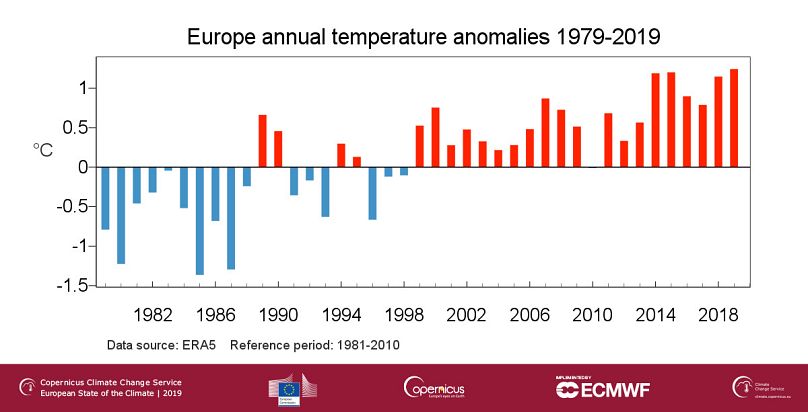While last year was the warmest year on record for Europe, this was closely followed by 2014, 2015 and 2018.
Eleven of the 12 warmest years on record have occurred since the year 2000 with last year being the warmest ever for Europe, according to research from Copernicus.
According to the study, Europe is warming up at a higher rate than the global average. "The temperature increase for Europe is about 0.9°C higher than the global one and it has also warmed up faster than any other continent in recent decades," the report says. But they point out that it is not unexpected, because climate change affects the northern hemisphere more. Although "other factors may also influence".
The data found there had also been a general trend of warming temperatures over the last 40 years.
This led to last year's summer heatwave in Europe causing record surface ice melt in Greenland.
In fact, according to Copernicus, the mean average temperature over the last five years is around 1.1°C above that of the pre-industrial era and is nearly 2°C higher than Europe's mean average during the second half of the 19th century.
This can be compared to the temperature rises stipulated in the Paris Agreement, which seeks to keep the global average temperature 2°C below the pre-industrial era, and limit the increase below 1.5°C.
Although Copernicus explains that it is difficult to establish a direct cause-and-effect relationship between global warming and extreme events, statistics will tell you that last year was marked by a series of record-breaking episodes.
Heatwaves in 2019 also led to several countries in Europe, including France, Germany, Belgium, the Netherlands, and the UK, beating their all-time temperature records.
And while last year was the warmest year on record for Europe, this was closely followed by 2014, 2015 and 2018.
Carlo Buontempo, Director of the Copernicus Climate Change Service (C3S), said that while one "exceptional year" of heat does not indicate a trend, the data over a longer period of time can build a bigger picture on the changing climate.
He said: “It is now more vital than ever before that everyone has access to this information to help us understand the longer-term implications of climate change and what organisations and individuals can do to reduce its effects.
"One exceptional warm year does not constitute a warming trend, but to have detailed information from our operational service, that covers many different aspects of our climate, we are able to connect the dots to learn more about how it is changing.”













